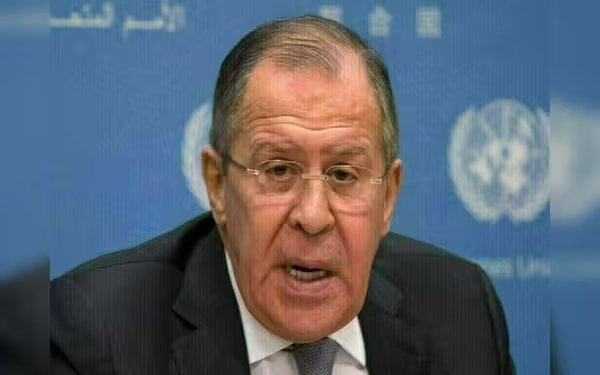Saturday, November 16, 2024 08:33 PM
Russia Criticizes US Actions at ASEAN Summit
- Lavrov labels US actions in Asia as destructive.
- Concerns over Japan's militarization and military alliances.
- US attempts to politicize ASEAN summit outcomes.
 Image Credits: brecorder
Image Credits: brecorderRussian Foreign Minister Lavrov criticizes US actions in Asia as destructive during the ASEAN summit, raising concerns over militarization and alliances.
In recent discussions at the East Asia Summit held in Laos, Russian Foreign Minister Sergei Lavrov expressed strong criticism of the United States' actions in Asia, labeling them as "destructive." This statement comes amid rising tensions in the region, particularly concerning military alliances and the increasing militarization of countries like Japan. Lavrov's remarks highlight the ongoing geopolitical struggle between major powers, with Russia and China on one side and the United States and its allies on the other.
During the summit, Lavrov accused the US of fostering a climate of militarization in Japan, suggesting that Washington is influencing Tokyo to adopt a more aggressive military posture. He stated, "The destructive character of US actions in this part of the world is obvious," indicating that he believes these actions could lead to increased conflict. This concern is particularly relevant as Japan has proposed the idea of forming a NATO-style military alliance in Asia, which Lavrov warned could escalate tensions further. He remarked, "Ideas about creating military blocs always carry risks of confrontation that could escalate." This statement underscores the delicate balance of power in the region and the potential for misunderstandings that could lead to conflict.
Lavrov also pointed out that the US, along with its allies such as Japan, South Korea, New Zealand, and Australia, attempted to influence the summit's final statement, making it "deeply politicised." He argued that these Western countries are trying to use their relationships with ASEAN (the Association of Southeast Asian Nations) to undermine the interests of Russia and China. This assertion reflects a broader concern that the US is seeking to expand its influence in Asia at the expense of other nations.
The implications of these developments are significant. As countries in Asia navigate their relationships with both the US and Russia, they must consider the potential consequences of aligning too closely with one side or the other. The call for military alliances and the push for increased militarization could lead to a more divided and tense region. It is essential for nations to engage in dialogue and seek peaceful resolutions to their differences, rather than escalating military tensions.
The remarks made by Lavrov at the ASEAN summit serve as a reminder of the complex and often contentious nature of international relations in Asia. As countries grapple with the influence of major powers, it is crucial to prioritize diplomacy and cooperation over confrontation. The future stability of the region may depend on the ability of nations to work together and find common ground, rather than allowing external pressures to dictate their paths.













